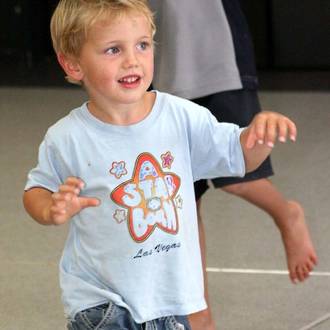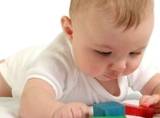9 ways music & movement helps young kids learn
|
By adding music to movement young kids gain so many more benefits beyond movement alone, and it is lots of fun! From developing their language, memory and social skills to creative thinking and focused listening, they also start to build music foundations such as singing in tune and moving in time. So what can young kids get out of well-written music and movement experiences?
|
You might also be interested in ...
4 Benefits of screen time for preschoolers
It’s not often we associate ‘benefits’ with screen time, but when used in moderation there are some benefits to be had for pre-school kids. It’s all about balance! Find out more about the educational, communication, creative and physical benefits of screen time.
6 tips on Tummy Time for babies
Not all babies like their first few sessions of tummy time, but with your encouragement it’s an early developmental milestone they’ll start to enjoy in their own time. However, the sooner you start, the quicker they will adapt. Check out our useful tummy time tips.







From developing their language, memory and social skills to creative thinking and focused listening, they also start to build music foundations such as singing in tune and moving in time.
Children’s brains grow at their fastest rate in the first three years of their life, so it makes sense to offer rich sensory learning experiences during this time such as musical activities.
So what can young kids get out of well-written music and movement experiences?
1. Overall health
We know kids learn through doing, and that movement whether it’s running around or dancing away to music, is critical in a child’s development.Movement is important for developing strength in their bones and muscles, developing their blood circulation and overall health.
2. Co-ordination
Through songs which require movement or specific actions, children learn to co-ordinate their hands, feet and bodies in actions that are not normally part of everyday life, but can help develop extensive connections across their brain.Songs with a beat or lyrics which encourage children to walk, hop, jump, gallop, skip, crawl, stamp, or creep all help develop their motor skills, balance and co-ordination.
3. Feeling good
Music motivates kids to move. Up-tempo music is energizing and fun and movement associated with that music oxygenates their brains, and pumps blood round their bodies making them feel good.4. Body awareness & balance
Songs which ask kids to swing, stretch, bend, twist and spin help to develop their body awareness and balance.5. Language development
By immersing children in musical activities, they start to develop their language skills too.Children’s songs often have repeated phrases and use rhyme, which makes them easier for young kids to remember.
Songs which have words that describe their actions help children to understand language.
For example, if you sing a song about going up and down, and your hands and the melody move up and down, then your little one will start to develop a real understanding of the concepts ‘up’ and ‘down’.
Words have syllables which can become rhythms, and an awareness of syllables helps spelling and reading later on.
6. Memory
Don’t just play music and expect kids to get much benefit. Instead use musical activities to help them improve their memory.Musical activities are multi-sensory and because they involve vision, hearing and movement, so many brain areas are involved.
There are lots of sequences in music too, whether they are words, rhythms, melodies or actions and these all help to make the memories and learning more lasting than just watching or hearing something.
7. Focused listeners
Music builds focused listeners, and as adults, wouldn’t we all love kids to be able to listen more effectively!Because musical activities use sound, there are constant cues for the children to notice and react to.
They learn to drive their bodies in movements which match the music, then change them when the music or the lyrics asks them to.
8. Imagination
Songs which are about pretending to do something or be something help develop kids’ imagination as well as language associated with that topic.For example, a song about digging in the garden uses different words (and actions) to one about flying a spaceship.
Songs can also help children to visualise what they’re singing about.
9. Stimulation
Music and movement combined are a great way to stimulate young kids.For example, when a child marches around the room to music and plays a drum, many different sorts of stimulation enter their brain at once:
You could be forgiven for thinking that children were just playing and dancing around, but in reality there are so many possible learning opportunities in well-written music and movement experiences.
More Hot Topics for you to enjoy:
Source: This article was written by Janet Channon, Director of Kids Music Company - holistic, user-friendly kids music classes and activities to help babies, toddlers, pre-schoolers and school-age children develop their bodies and brains, setting them up for life.